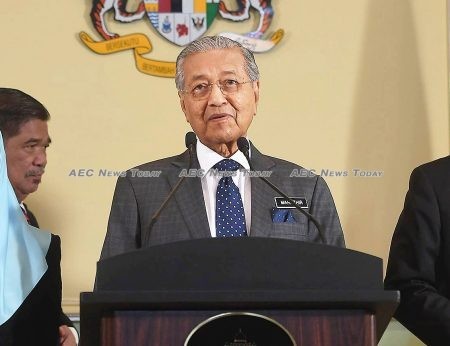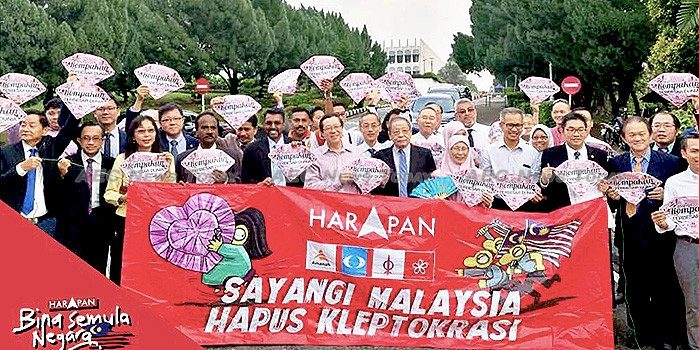The pattern of political reform following a regime change is usually predictable: the reformers gain popular support, make changes to the constitution and then use constitutional politics to achieve their ends. But Malaysia’s current period of political change is straying far from this pattern. Instead, Malaysia is proving that peaceful transition and reform may be possible without debates about constitutional amendment.
The new Pakatan Harapan (PH) government — a coalition of four political parties — was unexpectedly elected to power on May 9, 2018, replacing the incumbent Barisan Nasional (BN) coalition government. Much of the PH’s current political leadership team were part of the BN’s largest member party and now discredited United Malays National Organisation (UMNO), including a former prime minister, two former deputy prime ministers, and a slew of former ministers and members of parliament.
The election also revived the political career of former and now incumbent Prime Minister, Mahathir Mohamad. Mr Mahathir had gone down in history as one of the strong men of Asian authoritarianism. His recent campaign replaced this image with one of a moderate democrat who believes in a free press, a two-party parliamentary system, and the rights of citizens.
Reforms popular, but not law of the land
Mr Mahathir’s campaigning against his old party carried enough rural Malay voters into the PH fold to overturn the BN’s dominance. Voters were appalled at the level of corruption in former prime minister Najib Razak’s government.
The contrast was stark between voters’ own economic struggles — including the extra burden of a goods and services tax — and the wanton expenditure of leaders like Mr Razak and his wife.
While the PH have not yet changed a single word of the constitution, it has already redefined the state as one based on good governance, the rule of law, parliamentarism, and the separation of powers.
The PH has proposed signing the international human rights covenants (except for the International Convention on the Elimination of All Forms of Racial Discrimination (ICERD)), abolishing the death penalty, and addressing the political and legislative autonomy of East Malaysian states Sabah and Sarawak.

The question now is whether the reform process is politically sustainable and can be constitutionally entrenched.
One challenge facing the PH coalition is that any ordinary legislative changes — let alone constitutional amendments — can easily be blocked in Malaysia’s upper house, which is still controlled by senators appointed by the former BN government.
The upper house has already rejected a bill to repeal the Fake News Act that was rushed through parliament by Mr Razak before the election to restrict criticism of the government regarding the 1Malaysia Development Berhad (1MDB) scandal.
Undercurrents of unease around handover
There are fears that the PH coalition may simply revert to the Malaysian dominant-coalition stereotype. These are partly fears that the leader of the People’s Justice Party, Anwar Ibrahim — the largest party of the PH coalition — will assert what he sees as his entitlement to the prime-ministership.

There are also worries about factionalism within Mr Ibrahim’s party, quite apart from tensions between the four coalition partners. As matters stand, Mr Mahathir is supposed to hand over to Mr Ibrahim within two years of the election. At 93-years-old, Mr Mahathir could hardly plan to go on longer than that, whatever the politics dictates.
For the time being at least, the reformers are in charge. Attorney General Tommy Thomas and Legal Affairs Minister Liew Vui Keong are implementing the PH’s campaign promises. These include the good-governance reforms that Mr Mahathir wryly suggests would not have been so extensive had the PH expected to win the election.
Bringing those guilty of corruption to account is the major priority at this point, and ensuring that problems such as the 1MDB scandal will not occur again is also high on the agenda.
Patience needed for overdue reforms
Despite the flurry of reforms, announcements, prosecution,s and policy changes since the election, most legal changes — such as abolition of the death penalty — remain to be implemented. These depend on parliamentary arithmetic.
But over the next two to three years, as current senators leave office, there will be opportunity for the PH government to gain much more control over the reform process. These reforms may well involve changes to the Senate itself, which has far too many appointed members and no longer fulfils its original purpose of protecting states’ rights. This of course assumes that PH will remain stable and reform-oriented.
Entrenching the reforms in the longer-term may also be a challenge. While an extended period of constitutional debate would be beneficial for the somewhat ad hoc current reform proposals, politics can change quickly. This could side-line reform and re-emphasise ethnic and religious issues.
The PH still has to establish its credentials with the majority of Malay voters. At the same time, Mr Ibrahim has consistently advocated democratic reforms and suffered in jail as a result of overweening executive power.
These reforms are so long overdue that many of them could become faits accomplis, or matters of consensus rather than contention. For the moment, the further down this road the reforms go, the harder it will be to reverse them.
This article was written by Andrew Harding, a professor of Law at the National University of Singapore (NUS). It first appeared on East Asia Forum under a Creative Commons License and is reproduced here with its permission.
Feature photo Pakatan Harapan
Related:
- How much has Malaysia changed since Mahathir’s unexpected success? (Asean Today)
- ICERD does not oppose our way of life: Malaysian human rights rally leaders (Channel NewsAsia)
- Malaysia media spreads its wings as Mahathir promises free speech (Nikkei Asian Review)
- Commentary: So much for a new Malaysia (Channel NewsAsia)
East Asia Forum
It consists of an online publication and a quarterly magazine, East Asia Forum Quarterly, which aim to provide clear and original analysis from the leading minds in the region and beyond.
Latest posts by East Asia Forum (see all)
- China’s South China Sea bullying seeing increased blowback from Asean claimants – February 2, 2022
- Illusionary, delusionary or visionary? Cambodia tests living with COVID-19 – December 6, 2021
- Prioritising a Philippine–EU FTA is vital for post-pandemic recovery – July 26, 2020
- Time for Asean to stand up for itself in the South China Sea – July 25, 2020


